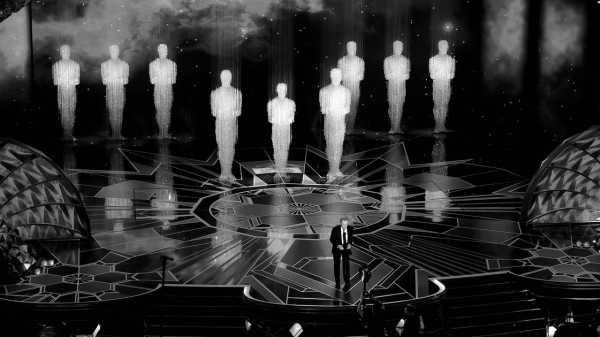
The gap between the art and the business of movies is larger than ever, and the planned changes to the Oscars announced today by the Academy of Motion Picture Arts and Sciences look like a desperate response to that chasm. The Academy plans to move the airdate of the ceremony up to early February, to shrink the telecast to three hours in order to offer “a more accessible Oscars for our viewers worldwide,” and to create a new category “for outstanding achievement in popular film.”
On the surface, the planned changes to the Oscars appear intended to address the declining viewership of the telecast (which, this year, was at an all-time low). But their over-all effect suggests a reaction to a much greater problem facing Hollywood: its increasing irrelevance to the art of the movies. This is a matter that even members of the Academy, people who work in Hollywood and its related businesses, have recognized with their Oscar votes in recent years. For instance, in 1939, the nine top-grossing films of the year were nominated for Best Picture; some of them (including John Ford’s “Stagecoach,” Ernst Lubitsch’s “Ninotchka,” and, I suppose, “The Wizard of Oz”) are, in fact, historically great. In 2017, by contrast, the highest-grossing films among the nominees (“Dunkirk” and “Get Out”) came in fourteenth and fifteenth in annual domestic box-office receipts; “The Shape of Water,” which won Best Picture, came in at number forty-six. “Moonlight,” which won Best Picture the year before, came in ninety-seventh. What’s more, in worldwide receipts—where Hollywood’s big-budget films now make a majority of their money—most of these films fell still lower in the charts, because culturally specific, locally anchored movies don’t travel as readily as ones made from preëxisting fantasy sources.
Occasionally, those big-budget movies are made by inspired directors who, granted sufficient freedom, transform their studio productions into original and personal works that can stand beside other, more conspicuously personal films—I’m thinking of “Wonder Woman” and, especially, of “Black Panther.” But these are the exceptions. Hollywood studios, like most large companies, move slowly. They were slow to change in the sixties in the face of cultural and political changes; they scrambled in the face of artistic competition from independent filmmakers and producers in the nineties; and when, under financial pressure because of competition from so-called quality television, they relinquished the production of director-driven movies to independent producers, they dug their own artistic grave.
When a new generation of filmmakers, richly educated in the most extreme trends of the art of the cinema thanks to the availability of VHS tapes and DVDs, brought forth movies of a new, original sensibility, they found themselves increasingly confined by the commercial demands of studio budgets and studio producers. They got their films made only when independent financiers with deep pockets and a love of movies—as well as an understanding that directorial originality is itself a valuable commodity in the cinematic marketplace—stepped in and offered lower budgets in exchange for extraordinary artistic freedom. The movies that grew out of these independent relationships, by and large, are the ones that have been getting nominated for Oscars; they’re the ones that critics and movie-business professionals alike recognize as being at or near the pinnacle of the art. And it’s for these independently produced projects that an Oscar win has special commercial significance, propelling lower-profile, lower-budget, and lower-box-office films onto the world stage. It’s no accident that the very notion of the Oscar campaign, of the high-powered behind-the-scenes exertion for awards, is the brainchild of Harvey Weinstein, an independent producer with Miramax who leveraged awards to vault his films and his company to a level of importance in Hollywood commensurate with that of the studios.
Because of this very commercial significance of awards for commercially minor films, the Academy’s decision to create a new award for “popular films” is more than absurd and desperate: it’s rankly offensive. The Academy hasn’t yet disclosed how the category will be defined—whether based on budget, box office, or producers’ own decree. In any case, the new award won’t devalue the artistic merits of a regular Best Picture victory—nobody will be fooled. But it will divert some of the limelight away from the actual Best Picture nominees and winners, and, in so doing, it will divert some of the commercial significance of those nominations and awards, as well. The new category appears to be a play by the studios to siphon off some of the commercial benefits of the awards—to redistribute Oscar-related money upward from independent producers to the studios, from productions costing and yielding tens of millions to ones costing and yielding hundreds of millions. It’s the Oscars equivalent of Republican tax “reform.”
Sourse: newyorker.com






